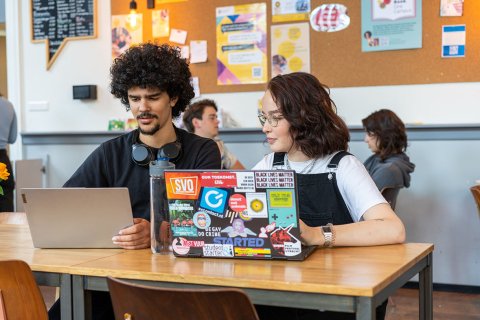Study programme
The Master's programme New Media & Digital Culture comprises one year (60 EC). A study year is divided into two semesters, running from September until January and from February until June. A semester is divided into two study periods.
Curriculum
Semester 1 | Study period 1 and 2
- 30 EC of theoretical training and acquisition of knowledge and insights in the field of new media and digital culture, with a particular focus on three key new media aspects (urban/mobile, games/play, and software/data) to be obtained in six courses.
Semester 2 | Study period 3 and 4
- 15 EC in the form of an MA thesis. The thesis consists of a scholarly text in which you are expected to contribute, on the basis of independent research, to a debate within the field of new media and digital culture. You are free to choose your own research subject, but are bound to the academic theories and methods in which you were trained.
- 15 EC of practical application of theory and method plus gaining real-life experience in the form of a research internship.

Educational methods
- seminars, group work and lectures
- research internship
- self study
Most courses will have a seminar format, meaning group work, oral presentations, and discussions supervised by the course lecturer; some courses will offer additional lecture sessions as well. In your research internship you will combine a mixture of practical activities with doing an embedded academic study. You will do a considerable amount of independent study, of which the largest part will be writing your Master’s thesis.
Research internship
You will be given the unique opportunity to test your acquired interdisciplinary skills in the programme’s compulsory research internship. A defining feature of New Media & Digital Culture at Utrecht University, the research internship challenges you to translate theoretical knowledge into everyday practice. This could mean you will help Utrecht media labs SETUP and Impakt create new media festivals, advise Microsoft on changing their internal communication, strategically develop Vodafone’s new social media campaign, or go abroad and work at Vamos or Starlize in Berlin.
Examinations
- individual and group essays/papers
- literature reviews
- internship research reports
- oral presentations
- thesis
This programme is taught in English. All writing assignments (including final essays/papers, the research internship report, and the Master's thesis) need to be written in English.
Extra opportunities
For students looking for an extra challenge in addition to their Master's, there are several options. Utrecht University offers several honours programmes for students looking for an extra challenge. Honours education is followed on top of your regular Master's programme and goes beyond the regular curriculum. Honours programmes are available at interdisciplinary level and allow you to work on projects that transcend your own discipline.

